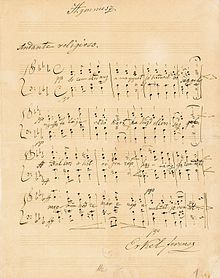Vengriya davlat madhiyasi
 | |
|
| |
| Soʻz muallif(lar)i | Kölcsey Ferenc, 1845 |
|---|---|
| Bastakor | Erkel Ferenc |
| Qabul qilindi |
1845 (de-fakto) 1949 yil (Vengriya Xalq Respublikasi tomonidan) 1989 yil (de-yure) |
"Milliy madhiya" (vengriya talaffuzi: [ˈhɪmnʊs]; lit. „Himn“ yoki „Gimna“) — Vengriya milliy madhiyasi.[1] Qoʻshiq matni 1823-yilda taniqli shoir Ferens Kölcsey tomonidan yozilgan va hozirda uning rasmiy musiqasi 1844-yilda romantik bastakor Ferenc Erkel tomonidan yaratilgan, ammo boshqa unchalik mashhur boʻlmagan musiqiy versiyalar mavjud. Sheʼrda „A magyar nép zivataros századaiból“ („Venger xalqining boʻronli asrlaridan“) sarlavhasi bor edi. Koʻpincha bu subtitr — zamonaviy milliy muammolardan koʻra oʻtmishni taʼkidlab, sheʼrga Gabsburg senzurasidan oʻtishga imkon berish uchun aniq qoʻshilgan deb taʼkidlanadi. Sheʼr matnining toʻliq maʼnosi faqat Vengriya tarixini yaxshi biladiganlarga ayon. Birinchi bayt rasmiy marosimlarda va umumiy tarzda kuylanadi. U 1844-yilda tuzilganidan beri Vengriya Qirolligining madhiyasi sifatida amalda ishlatilgan va 1989-yilda uchinchi Vengriya Respublikasining davlat madhiyasi sifatida rasman qabul qilingan.
„Himnusz“ qoʻshigʻi soʻzlari Isten, áldd meg a magyart (tinglang (yordam · maʼlumot)) soʻzlari bilan boshlanadigan ibodatdir (inglizcha: „Xudo, vengerlarga baraka ber“) maʼnosini beradi.
Sarlavha[tahrir | manbasini tahrirlash]
Asl qoʻlyozmadagi sarlavha „Himnus“ — lotincha soʻz boʻlib, „madhiya qoʻshigʻi“ degan maʼnoni anglatadi va ingliz tilidan boshqa tillarda masalan, fransuz yoki nemis tilida ham „madhiya“ maʼnosida keng qoʻllaniladi. „Himnusz“ fonetik transkripsiyasi vaqt oʻtishi bilan asl lotin imlosini almashtirdi va sheʼr Vengriyaning de-fakto madhiyasi sifatida keng eʼtirof etilgani sababli, „himnusz“ soʻzi boshqa mamlakatlar uchun ham „milliy madhiya“ maʼnosini oldi.
Tarix[tahrir | manbasini tahrirlash]
Kölcsey sheʼrni 1823-yil 22-yanvarda tugatgan boʻlsa-da, u birinchi marta 1829-yilda Károly Kisfaludyning „Avrora“da qoʻlyozmaning bir qismi boʻlishiga qaramay, subtitrsiz nashr etilgan. Keyin u 1832 yilda Kölcsey asarlari toʻplamida, bu safar subtitr bilan chiqdi.[2] 1844-yilda sheʼrni xalq qo‘shig‘iga moslashtirish uchun bastakorlar tanlovi o‘tkazildi va unda Erkel g‘olib chiqdi. Uning versiyasi birinchi marta Milliy teatrda (u dirijyor boʻlgan) 1844-yil iyulda, soʻngra 1844-yil 10-avgustda „Szechenyi“ paroxodining birinchi sayohatida kengroq tomoshabinlar oldida namoyish etildi. 1850-yillarning oxiriga kelib, Himnuszni maxsus buyurtmada Vörösmartining Szózat qoʻshigʻi bilan birga yoki yakka holda kuylash odat tusiga kirdi.
Rasmiy foydalanish[tahrir | manbasini tahrirlash]
Jamoat radiosi Kossuth Rádio har kuni yarim tunda oʻn daqiqada Himnuszni AM diapazonidagi translyatsiyalar yopilganda, davlat telekanallari kunlik eshittirishlar oxirida ijro etadi. Himnush ham anʼanaviy tarzda Vengriya televideniesida Yangi yil arafasida yarim tunda ijro etiladi.
Matn[tahrir | manbasini tahrirlash]
| Venger tilida (Ferenc Kölcsey, 1823) |
IPA transkripsiyasi | Inglizcha tarjima (Laszlo Korossy, 2003)[3] |
Ingliz tiliga sheʼriy tarjima (William N. Loew, 1881) |
|---|---|---|---|
I |
1 |
I |
I |
Manbalar[tahrir | manbasini tahrirlash]
- ↑ „The Story Behind the Hungarian National Anthem“. Jules S. Vállay. 2017-yil 10-oktyabrda asl nusxadan arxivlangan. Qaraldi: 2017-yil 8-may.
- ↑ „A Himnusz története“ [History of Himnusz] (hu). Qaraldi: 2016-yil 17-may.
- ↑ „Isten Áldd Meg a Magyart!“. laszlokorossy.net. 2021-yil 25-fevralda asl nusxadan arxivlangan. Qaraldi: 2022-yil 27-yanvar.
Havolalar[tahrir | manbasini tahrirlash]
- Hungary: Himnusz — Audio of the national anthem of Hungary, with information and lyrics (archive link)
- National and historical symbols of Hungary (Wayback Machine saytida 2021-10-28 sanasida arxivlangan) has a page about the anthem, featuring a vocal sound file.
- Sheet Music is available at the Hungarian Electronic Library website.
- Hungarian Anthem on Music Keyboard 2.4
